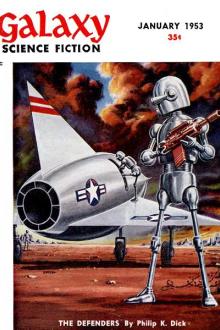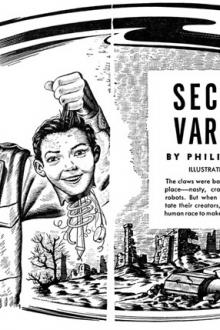Short Fiction Philip K. Dick (primary phonics books .txt) 📖

- Author: Philip K. Dick
Book online «Short Fiction Philip K. Dick (primary phonics books .txt) 📖». Author Philip K. Dick
Franks frowned at him and stood up. “We’re going up to first stage. We can discuss it there.”
“First stage?” Taylor repeated nervously. The three of them went down a side passage to a small lift. “I’ve never been up there. Is it all right? It’s not radioactive, is it?”
“You’re like everyone else,” Franks said. “Old women afraid of burglars. No radiation leaks down to first stage. There’s lead and rock, and what comes down the Tube is bathed.”
“What’s the nature of the problem?” Taylor asked. “I’d like to know something about it.”
“In a moment.”
They entered the lift and ascended. When they stepped out, they were in a hall of soldiers, weapons and uniforms everywhere. Taylor blinked in surprise. So this was first stage, the closest undersurface level to the top! After this stage there was only rock, lead and rock, and the great tubes leading up like the burrows of earthworms. Lead and rock, and above that, where the tubes opened, the great expanse that no living being had seen for eight years, the vast, endless ruin that had once been Man’s home, the place where he had lived, eight years ago.
Now the surface was a lethal desert of slag and rolling clouds. Endless clouds drifted back and forth, blotting out the red sun. Occasionally something metallic stirred, moving through the remains of a city, threading its way across the tortured terrain of the countryside. A leady, a surface robot, immune to radiation, constructed with feverish haste in the last months before the cold war became literally hot.
Leadys, crawling along the ground, moving over the oceans or through the skies in slender, blackened craft, creatures that could exist where no life could remain, metal and plastic figures that waged a war Man had conceived, but which he could not fight himself. Human beings had invented war, invented and manufactured the weapons, even invented the players, the fighters, the actors of the war. But they themselves could not venture forth, could not wage it themselves. In all the world—in Russia, in Europe, America, Africa—no living human being remained. They were under the surface, in the deep shelters that had been carefully planned and built, even as the first bombs began to fall.
It was a brilliant idea and the only idea that could have worked. Up above, on the ruined, blasted surface of what had once been a living planet, the leady crawled and scurried, and fought Man’s war. And undersurface, in the depths of the planet, human beings toiled endlessly to produce the weapons to continue the fight, month by month, year by year.
“First stage,” Taylor said. A strange ache went through him. “Almost to the surface.”
“But not quite,” Moss said.
Franks led them through the soldiers, over to one side, near the lip of the Tube.
“In a few minutes, a lift will bring something down to us from the surface,” he explained. “You see, Taylor, every once in a while Security examines and interrogates a surface leady, one that has been above for a time, to find out certain things. A vidcall is sent up and contact is made with a field headquarters. We need this direct interview; we can’t depend on vidscreen contact alone. The leadys are doing a good job, but we want to make certain that everything is going the way we want it.”
Franks faced Taylor and Moss and continued: “The lift will bring down a leady from the surface, one of the A-class leadys. There’s an examination chamber in the next room, with a lead wall in the center, so the interviewing officers won’t be exposed to radiation. We find this easier than bathing the leady. It is going right back up; it has a job to get back to.
“Two days ago, an A-class leady was brought down and interrogated. I conducted the session myself. We were interested in a new weapon the Soviets have been using, an automatic mine that pursues anything that moves. Military had sent instructions up that the mine be observed and reported in detail.
“This A-class leady was brought down with information. We learned a few facts from it, obtained the usual roll of film and reports, and then sent it back up. It was going out of the chamber, back to the lift, when a curious thing happened. At the time, I thought—”
Franks broke off. A red light was flashing.
“That down lift is coming.” He nodded to some soldiers. “Let’s enter the chamber. The leady will be along in a moment.”
“An A-class leady,” Taylor said. “I’ve seen them on the showscreens, making their reports.”
“It’s quite an experience,” Moss said. “They’re almost human.”
They entered the chamber and seated themselves behind the lead wall. After a time, a signal was flashed, and Franks made a motion with his hands.
The door beyond the wall opened. Taylor peered through his view slot. He saw something advancing slowly, a slender metallic figure moving on a tread, its arm grips at rest by its sides. The figure halted and scanned the lead wall. It stood, waiting.
“We are interested in learning something,” Franks said. “Before I question you, do you have anything to report on surface conditions?”
“No. The war continues.” The leady’s voice was automatic and toneless. “We are a little short of fast pursuit craft, the single-seat type. We could use also some—”
“That has all been noted. What I want to ask you is this. Our contact with you has been through vidscreen only. We must rely on indirect evidence, since none of us goes above. We can only infer what is going on. We never see anything ourselves. We have to take it all secondhand. Some top leaders are beginning to think there’s too much room for error.”
“Error?” the leady asked. “In what way? Our reports are checked carefully before they’re sent down. We maintain constant contact with you; everything of value is reported. Any new weapons which the enemy is seen to employ—”
“I realize that,” Franks grunted behind his





Comments (0)